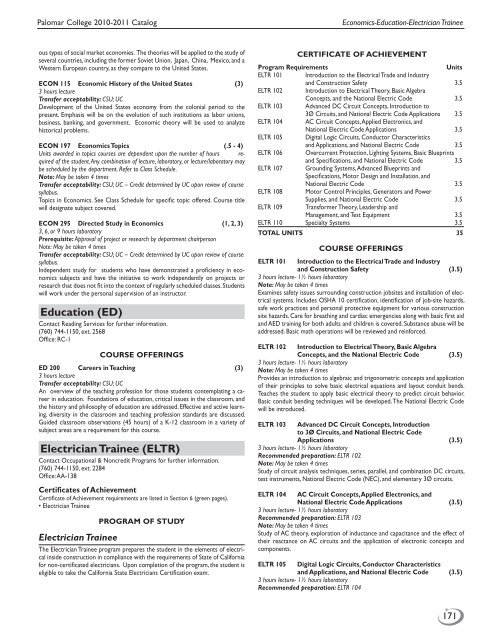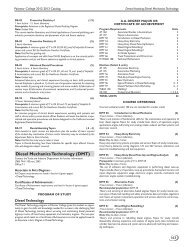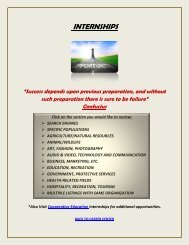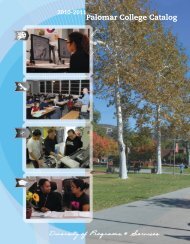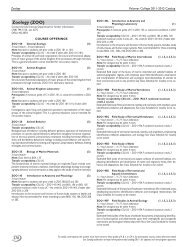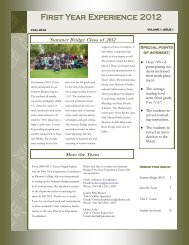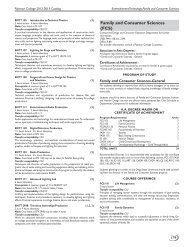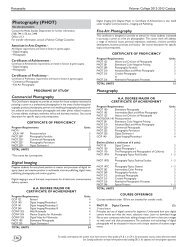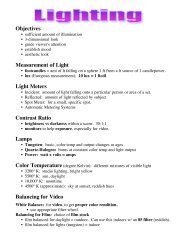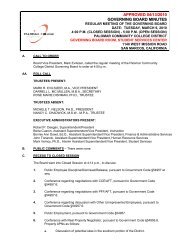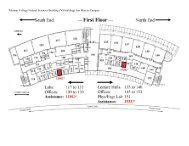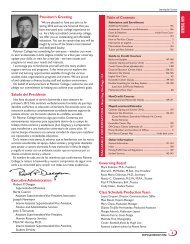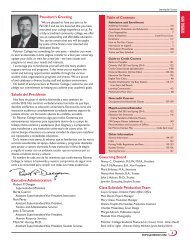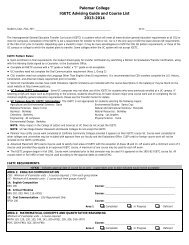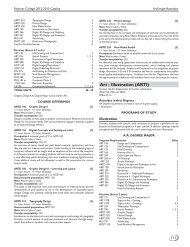Download the complete catalog - Palomar College
Download the complete catalog - Palomar College
Download the complete catalog - Palomar College
Create successful ePaper yourself
Turn your PDF publications into a flip-book with our unique Google optimized e-Paper software.
<strong>Palomar</strong> <strong>College</strong> 2010-2011 Catalog<br />
Economics-Education-Electrician Trainee<br />
ous types of social market economies. The <strong>the</strong>ories will be applied to <strong>the</strong> study of<br />
several countries, including <strong>the</strong> former Soviet Union, Japan, China, Mexico, and a<br />
Western European country, as <strong>the</strong>y compare to <strong>the</strong> United States.<br />
ECON 115 Economic History of <strong>the</strong> United States (3)<br />
3 hours lecture<br />
Transfer acceptability: CSU; UC<br />
Development of <strong>the</strong> United States economy from <strong>the</strong> colonial period to <strong>the</strong><br />
present. Emphasis will be on <strong>the</strong> evolution of such institutions as labor unions,<br />
business, banking, and government. Economic <strong>the</strong>ory will be used to analyze<br />
historical problems.<br />
ECON 197 Economics Topics (.5 - 4)<br />
Units awarded in topics courses are dependent upon <strong>the</strong> number of hours required<br />
of <strong>the</strong> student. Any combination of lecture, laboratory, or lecture/laboratory may<br />
be scheduled by <strong>the</strong> department. Refer to Class Schedule.<br />
Note: May be taken 4 times<br />
Transfer acceptability: CSU; UC – Credit determined by UC upon review of course<br />
syllabus.<br />
Topics in Economics. See Class Schedule for specific topic offered. Course title<br />
will designate subject covered.<br />
ECON 295 Directed Study in Economics (1, 2, 3)<br />
3, 6, or 9 hours laboratory<br />
Prerequisite: Approval of project or research by department chairperson<br />
Note: May be taken 4 times<br />
Transfer acceptability: CSU; UC – Credit determined by UC upon review of course<br />
syllabus.<br />
Independent study for students who have demonstrated a proficiency in economics<br />
subjects and have <strong>the</strong> initiative to work independently on projects or<br />
research that does not fit into <strong>the</strong> context of regularly scheduled classes. Students<br />
will work under <strong>the</strong> personal supervision of an instructor.<br />
Education (ED)<br />
Contact Reading Services for fur<strong>the</strong>r information.<br />
(760) 744-1150, ext. 2568<br />
Office: RC-1<br />
COURSE OFFERINGS<br />
ED 200 Careers in Teaching (3)<br />
3 hours lecture<br />
Transfer acceptability: CSU; UC<br />
An overview of <strong>the</strong> teaching profession for those students contemplating a career<br />
in education. Foundations of education, critical issues in <strong>the</strong> classroom, and<br />
<strong>the</strong> history and philosophy of education are addressed. Effective and active learning,<br />
diversity in <strong>the</strong> classroom and teaching profession standards are discussed.<br />
Guided classroom observations (45 hours) of a K-12 classroom in a variety of<br />
subject areas are a requirement for this course.<br />
Electrician Trainee (ELTR)<br />
Contact Occupational & Noncredit Programs for fur<strong>the</strong>r information.<br />
(760) 744-1150, ext. 2284<br />
Office: AA-138<br />
Certificates of Achievement<br />
Certificate of Achievement requirements are listed in Section 6 (green pages).<br />
• Electrician Trainee<br />
Electrician Trainee<br />
PROGRAM OF STUDY<br />
The Electrician Trainee program prepares <strong>the</strong> student in <strong>the</strong> elements of electrical<br />
inside construction in compliance with <strong>the</strong> requirements of State of California<br />
for non-certificated electricians. Upon completion of <strong>the</strong> program, <strong>the</strong> student is<br />
eligible to take <strong>the</strong> California State Electricians Certification exam.<br />
Certificate of Achievement<br />
Program Requirements<br />
Units<br />
ELTR 101 Introduction to <strong>the</strong> Electrical Trade and Industry<br />
and Construction Safety 3.5<br />
ELTR 102 Introduction to Electrical Theory, Basic Algebra<br />
Concepts, and <strong>the</strong> National Electric Code 3.5<br />
ELTR 103 Advanced DC Circuit Concepts, Introduction to<br />
3Ø Circuits, and National Electric Code Applications 3.5<br />
ELTR 104 AC Circuit Concepts, Applied Electronics, and<br />
National Electric Code Applications 3.5<br />
ELTR 105 Digital Logic Circuits, Conductor Characteristics<br />
and Applications, and National Electric Code 3.5<br />
ELTR 106 Overcurrent Protection, Lighting Systems, Basic Blueprints<br />
and Specifications, and National Electric Code 3.5<br />
ELTR 107 Grounding Systems, Advanced Blueprints and<br />
Specifications, Motor Design and Installation, and<br />
National Electric Code 3.5<br />
ELTR 108 Motor Control Principles, Generators and Power<br />
Supplies, and National Electric Code 3.5<br />
ELTR 109 Transformer Theory, Leadership and<br />
Management, and Test Equipment 3.5<br />
ELTR 110 Specialty Systems 3.5<br />
TOTAL UNITS 35<br />
COURSE OFFERINGS<br />
ELTR 101 Introduction to <strong>the</strong> Electrical Trade and Industry<br />
and Construction Safety (3.5)<br />
3 hours lecture- 1½ hours laboratory<br />
Note: May be taken 4 times<br />
Examines safety issues surrounding construction jobsites and installation of electrical<br />
systems. Includes OSHA 10 certification, identification of job-site hazards,<br />
safe work practices and personal protective equipment for various construction<br />
site hazards. Care for breathing and cardiac emergencies along with basic first aid<br />
and AED training for both adults and children is covered. Substance abuse will be<br />
addressed. Basic math operations will be reviewed and reinforced.<br />
ELTR 102 Introduction to Electrical Theory, Basic Algebra<br />
Concepts, and <strong>the</strong> National Electric Code (3.5)<br />
3 hours lecture- 1½ hours laboratory<br />
Note: May be taken 4 times<br />
Provides an introduction to algebraic and trigonometric concepts and application<br />
of <strong>the</strong>ir principles to solve basic electrical equations and layout conduit bends.<br />
Teaches <strong>the</strong> student to apply basic electrical <strong>the</strong>ory to predict circuit behavior.<br />
Basic conduit bending techniques will be developed. The National Electric Code<br />
will be introduced.<br />
ELTR 103 Advanced DC Circuit Concepts, Introduction<br />
to 3Ø Circuits, and National Electric Code<br />
Applications (3.5)<br />
3 hours lecture- 1½ hours laboratory<br />
Recommended preparation: ELTR 102<br />
Note: May be taken 4 times<br />
Study of circuit analysis techniques, series, parallel, and combination DC circuits,<br />
test instruments, National Electric Code (NEC), and elementary 3Ø circuits.<br />
ELTR 104 AC Circuit Concepts, Applied Electronics, and<br />
national Electric Code Applications (3.5)<br />
3 hours lecture- 1½ hours laboratory<br />
Recommended preparation: ELTR 103<br />
Note: May be taken 4 times<br />
Study of AC <strong>the</strong>ory, exploration of inductance and capacitance and <strong>the</strong> effect of<br />
<strong>the</strong>ir reactance on AC circuits and <strong>the</strong> application of electronic concepts and<br />
components.<br />
ELTR 105 Digital Logic Circuits, Conductor Characteristics<br />
and Applications, and National Electric Code (3.5)<br />
3 hours lecture- 1½ hours laboratory<br />
Recommended preparation: ELTR 104<br />
171


